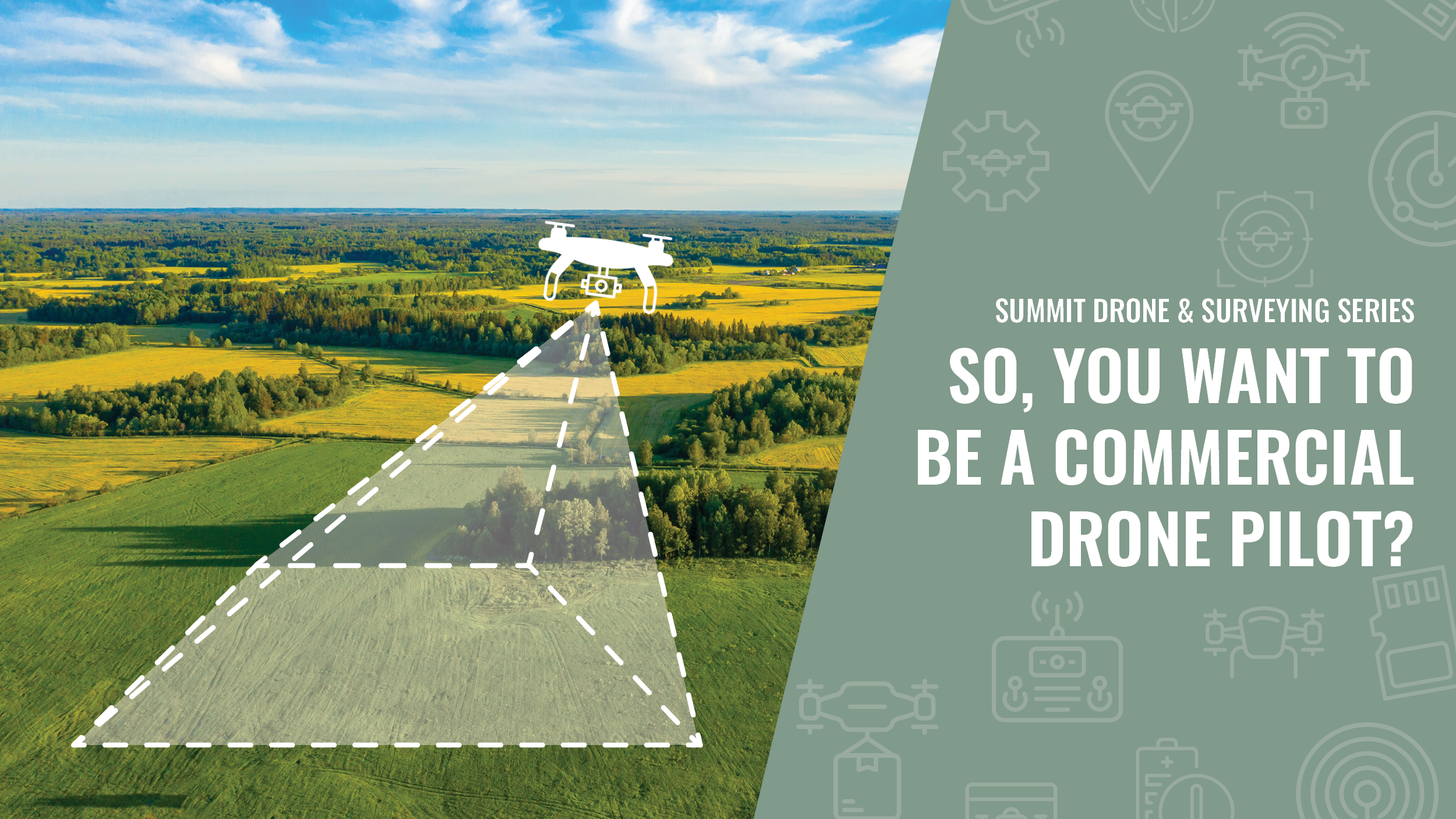Introduction
The future of construction surveying lies in the skies, where cutting-edge technology revolutionizes how we approach and execute tasks on a job site. With their ability to capture high-resolution aerial imagery and collect data from even the most challenging terrains, drones are becoming an invaluable asset to surveyors who become Commercial Drone Pilots. Using them correctly can reshape how we approach surveying by enhancing the flexibility, speed, and efficiency of the work surveyors perform.
But being able to use drones effectively is not so simple. After all, it’s not a matter of simply purchasing a drone and flying it straight out of the box. To use drones on the job safely, effectively, and legally, you need to obtain a Commercial Drone Pilot License. This then begs the question: What steps do pilots take to obtain their license?
We’ve got you covered. This article will walk you through the steps on what Commercial Drone Pilots need to know and do to obtain their licenses. From preparing for your test to registering your drone and everything in between, we’ve outlined the steps necessary to ensure success as your drone takes to the skies.
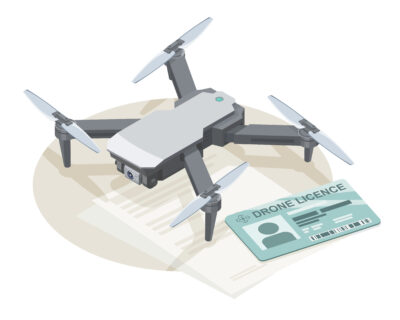
What is a Commercial Drone Pilot?
Commercial Drone Pilots are individuals who utilize and operate drones on behalf of a commercial or government interest. This is often done to collect sensor data, thermal imaging, aerial photography and video, and survey images.
Even recreational drone pilots require that the potential pilot pass a test and register their drone, but commercial drone pilots are subject to more stringent requirements. This is to ensure that the pilot is aware of the restrictions placed on drone flight, that the TSA has vetted them, and that they have a working knowledge of federal regulations and airspace usage.
What is Commercial Drone Usage?
Any drone flight operation that result in compensation for the drone pilot or that services a business qualifies as a commercial usage. This includes using drones to take pictures of job sites or to collect survey data. Even if the drone being used to perform the tasks is personally owned by the individual flying it, if the intention is to make any money off of the work performed by the drone, its usage becomes commercial.
The variety of fields that utilize drones may surprise you: the same services that survey and construction industries make use of can also be used to support marketing teams, capture video for entertainment purposes, assist with insurance risk assessments, and more. The versatility of drones and the utility they can provide to a team is what makes them such a valuable tool, and one with ever growing potential.
One thing to keep in mind when using a drone for commercial purposes is that the FAA requires that the pilot know the intention of the drone’s flight before it takes off. That means that all activities being taken in the air should service a specific intention or goal and cannot be used afterwards for other means.
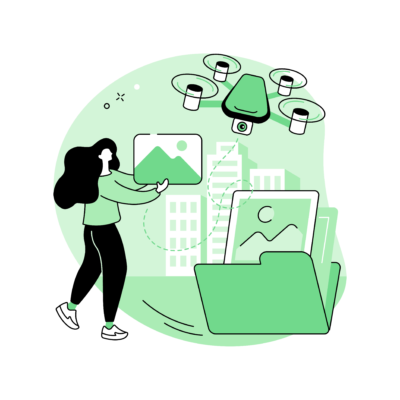
Becoming a Commercial Drone Pilot
There are a few key steps to becoming a commercial drone pilot:
- Prepare for the test
- Obtain an FAA Tracking Number (FTN)
- Pass the FAA Unmanned Aircraft General Test
- Obtain your Remote Pilot Number
- Apply for your states Department of Transportation Remote Pilot Certificates

Prepare for the Test
Before you can even consider becoming a licensed commercial drone pilot, you have to ensure you meet the basic criteria. To qualify for your drone license, you must:
- Be at least 16 years old;
- Be able to read, write, and speak English;
- Be physically and mentally able to fly a drone.
If you meet these basic criteria, then your next step will be to prepare for the Unmanned Aircraft General (UAG) test.
The FAA requires commercial drone pilots to take this short knowledge test and pass with a score of 70% or higher. The UAG knowledge exam tests you on Drone rules and FAA regulations, nighttime operations, how the National Airspace System works, reading sectional charts, reading weather reports, drone flight operations, and more. There are many online resources available to prospective drone pilots who want to study for this exam, so keep your eyes peeled for reputable sources of study information.
Obtain your FAA Tracking Number
Once you are ready to take the exam, you need to sign up for an account on Integrated Airman Certification and Rating Application (IACRA) and obtain your FAA Tracking Number (FTN). You can then sign up to take your exam.
Your FTA is a unique designator given to all “airmen,” including remote drone pilots. Once you have your FTN, it will remain a permanent designation for the FAA to be able to identify you. It is required that you obtain this number before signing up for your test.
Pass the Unmanned Aircraft General (UAG) Test
Once you have your FTA, you can sign up to take the UAG Test. This in-person exam is 60 questions long and allows a prospective pilot up to 120 minutes to complete. While the test does require an appointment, there are more than 700 FAA-certified testing locations across the country that you can use. Be sure to bring a government ID to verify your identity before taking the exam.
Unfortunately, the certification exam is not free. There is a flat $175 fee for anyone taking the test, which is not refundable. Certain jobs may pay for you to take this test or reimburse any costs upon successfully passing the exam, so be sure to check and see if this is the case with your employer.
Once you pass your FAA knowledge exam, make sure you keep your piece of paper that has your 17-digit knowledge exam ID. You will log back into IACRA and fill out an application to get your Remote Pilot Certification. Depending on the FAA backlog, it can take up to 90 days to get your official pilot number and 6-8 weeks to receive your pilot card in the mail. Once you have your certificate, be sure to keep it on hand every time you fly your drone for commercial purposes.
Apply for your Department of Transportation’s Remote Pilot Certificates
Once you’ve obtained your official remote pilot number, you can check with your state to see what state and municipal restrictions, requirements, and certifications may apply to you. For example, having your official remote pilot number in North Carolina means you can apply for the NCDOT Commercial and NCDOT Government Remote Pilot Certificates. To obtain your NCDOT certifications, you need to take and pass NCDOT’s Online UAS Knowledge Exam.
Every 24 months, you must renew your FAA Remote Pilot Certificate and NCDOT Commercial and Government Remote Pilot Certificates.
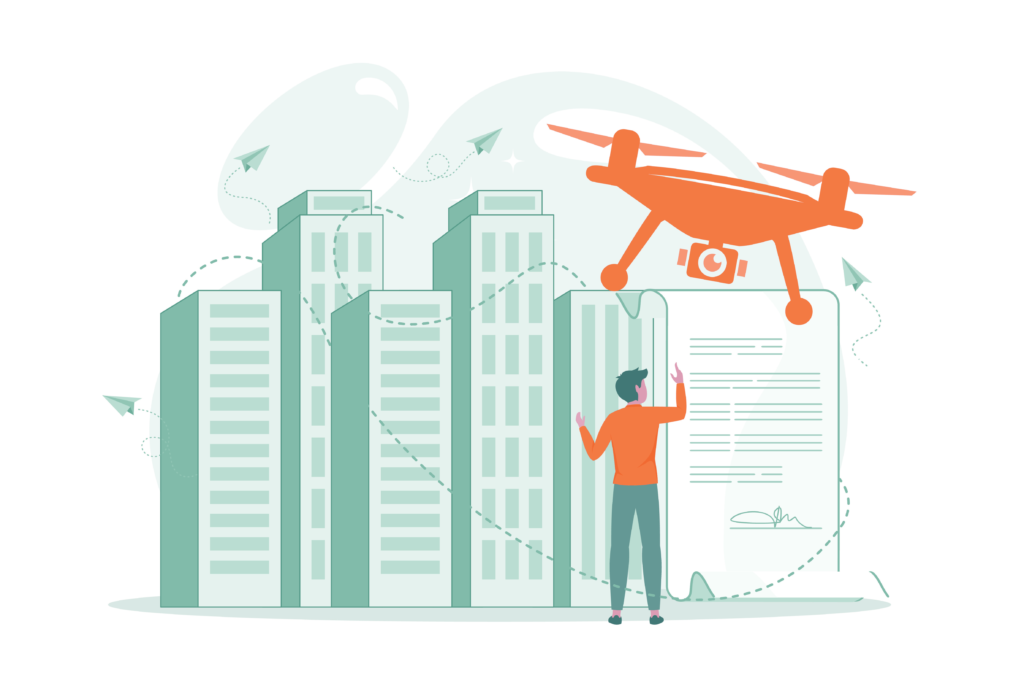
How To Register Your Drone
Did you know that all drone owners must register their drones? The only exception to this rule is if the drone weighs less than 0.55 pounds (250 grams).
A big misconception among drone users is that only commercial drone operators must register their drones. This statement is false. The only way to determine if you need to register your drone is to ask yourself: “Does the drone weigh 0.55 pounds (250 grams) or less?”
If your drone weighs under 0.55 pounds and is being flown recreationally, great! You don’t need to register it with the FAA. However, keep in mind that even if your drone weighs less than 0.55 pounds, if it is being flown commercially, it will still need to be registered with the FAA regardless of weight.
Registering your drone is very easy. Some information to know before registering your drone is:
- It only costs $5 per drone.
- You must be 13 years or older; otherwise, a parent or guardian must register it for you.
- If your drone weighs 55 pounds or more, you will be completing a separate registration process.
- There is only ONE website that you can register on: http://faadronezone-access.faa.gov/#/
- There are many scammer websites, so make sure you are on the correct website when registering.
After all of that information, you are probably wondering how you correctly register your drone with the FAA. The FAA offers two ways to correctly register your drone: online or by mail. How you determine which way you register your drone is by how much it weighs.
Registering Online
As mentioned above, the FAA Drone Zone is the only website where you can register your drone. Drones that weigh up to 55 pounds can be registered using this website.
In order to register your drone, you will need the following information:
- Your email address
- A credit or debit card to complete the $5 payment.
- Both a physical address and a mailing address. You only need to enter a mailing address if it differs from your physical one.
- The make, model, and serial number of your drone.
Once you pay the $5 registration fee, your registration is valid for three years.
Common Questions About Drone Registeration
What if my drone weighs more than 55 pounds?
You will have to follow the FAA’s paper-based registration process.
How do I mark my drone with my commercial registration number?
Your registration number must be legible and durable. Standard methods for marking your drone include engraving, self-adhesive labels, and permanent markers. It needs to be visible and accessible.
What happens if my UAS is destroyed, sold, lost, or transferred to another operator?
You should go on FAADroneZone and cancel your registration.
Do I need to have my certificate of aircraft registration with me while flying my drone?
Yes, you need to keep it in your possession when operating a drone. It should be available either by paper or easy to access electronically.
Different States, Different Laws
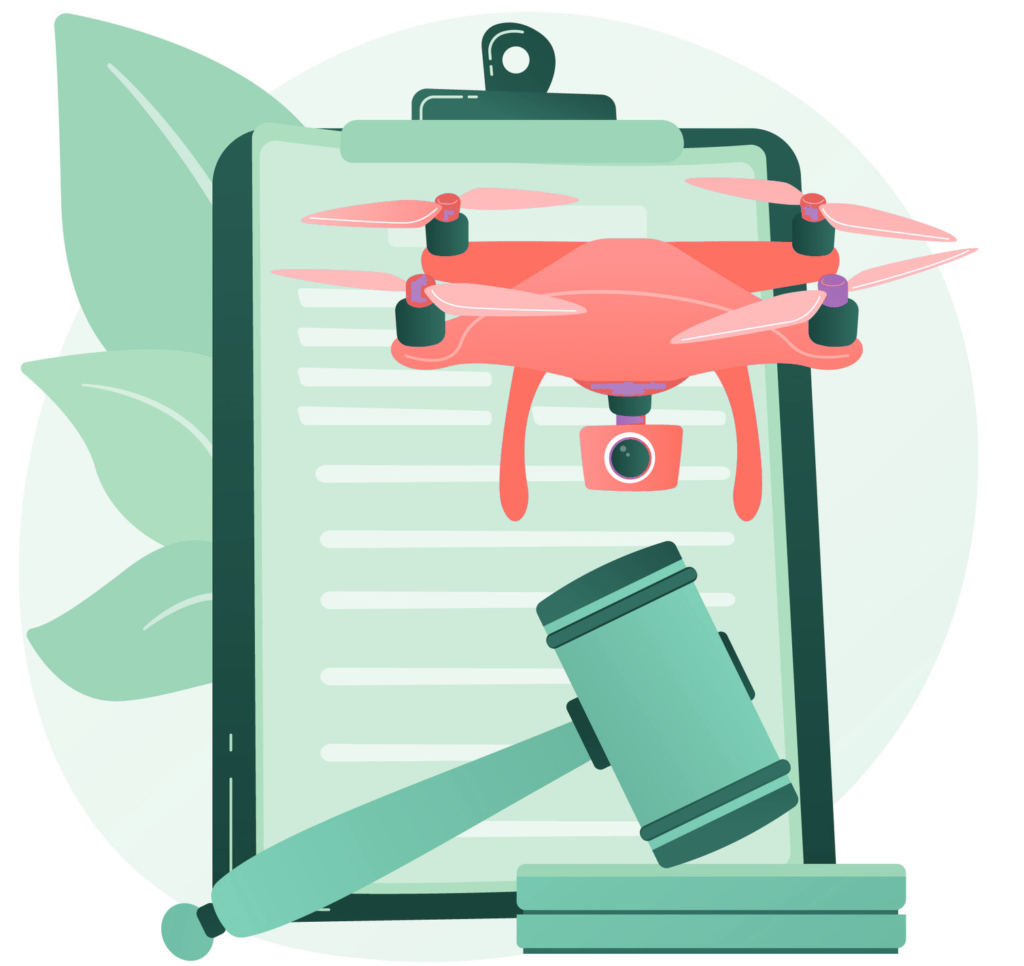
Did you know that some States have their Drone laws in addition to the FAA laws that you need to follow? This section will walk through a few of these states as an example.
Summit operates in all of the following states, making them perfect examples.
This list is not exhaustive, nor does it cover every state with additional drone laws. As always, be sure to take the time to investigate what the laws are for your given state before flying your drone.
If you have a drone, chances are that you would want to fly it in Colorado to capture some fantastic photos and videos from the air. Before flying your drone in Colorado, there are a couple of State-wide laws that concern drone operators:
- It is unlawful to operate drones in Colorado State Parks except in designated areas. The designated drone-use areas include Cherry Creek State Park and Chatfield State Park. These two parks have designated areas for drone operations.
- The other law in Colorado is that the Department of Public Safety is required to conduct a study to find ways to safely integrate UAS in government public safety operations such as emergency response, firefighting, search and rescue, and crime scene documentation.
- It is unlawful to use a drone to aid in looking for, scouting, or detecting wildlife for hunting.
Colorado also has local laws that apply in some regions, counties, or cities:
- In Colorado Springs, you cannot operate a drone in any park without written consent from the Colorado Parks, Recreation and Cultural Services. You must obtain a Commercial Film Permit to fly a drone for commercial use. There are also restrictions on drone operation in the Garden of the Gods Park.
- In Boulder County, you must have an approved permit for all UAS flights and operations. This permit must be submitted at least ten business days before the drone operation, and you must have liability insurance.
- The City of Boulder does not allow you to launch, land, or operate any unmanned motorized vehicle from or on any City of Boulder Open Space and Mountain Parks land. Permits may be granted for research, search and rescue, wildlife management, and other authorized uses.
- The City of Denver does not allow you to launch or operate drones in any Denver Park Facility except at specifically designated areas. Exceptions apply if you have a permit to operate.
- The City of Lakewood prohibits drone flight operations in Bear Creek Lake Park and William F. Hayden Park. You also can not launch, land, or operate a drone from or on any City facility, park, or open space area without a permit except for designated “Unmanned Aircraft Flying Areas” in East Reservoir, Hutchinson Park, or Wright Street Park. You will also need a photo/video permit for any commercial or non-commercial video or photography activity within city limits.
- The City of Louisville prohibits drone launches, landings, or operation in City parks or open spaces except for an emergency landing.
- You must register with the City of Cherry Hills Village for recreational drone use. You also must not operate a drone over city property without authorization from the City Manager. You also must not enter, hover, launch, or land a drone on or over another person’s property without their consent.
- The City of Loveland requires a permit for recreational drone use at the following parks:
-
- Barnes Park and Fairgrounds Fields
- Centennial Park
- Fairgrounds Park
- Loveland Sports Park
- Mahaffey Park
- North Lake Park
Drones also can’t fly near nesting birds or be used to discharge or drop the payload. All commercial use of UAS is prohibited.
- The City of Fort Collins prohibits the operation of a UAS in any area designated and posted by the City as a City natural area.
- The Town of Vail prohibits recreational drone use in pedestrian areas and town-owned parking structures of Vail Village, Lionshead Village, Ford Park, and around Vail Valley Medical Center Heli-Port.
- The Town of Telluride requires written authorization from the Town Manager for a person to operate a drone on or over town property, over another person’s private property, or property of another person, or near any person, pedestrian, livestock, companion animal, or wildlife.
Are you thinking of a beach vacation in Florida? You’ll be happy to know that you can fly your drone on most beaches in the Sunshine State! Florida has four separate drone laws you need to follow in addition to the FAA’s:
- The first law pre-empts local regulation of UAS so that only Florida Legislature can make laws concerning the use of drones in the State. However, it allows local governments to enact drone ordinances related to nuisances, voyeurism, harassment, reckless endangerment, property damage, or other illegal acts. It also prohibits the operation of drones over or near critical infrastructure in most instances; you are not allowed to possess or operate a weaponized drone.
- You are prohibited from using a drone to capture any imagery of privately owned property or the owner, tenant, or occupant without consent if a reasonable expectation of privacy exists.
- Law Enforcement may use a drone if they obtain a warrant, there is a terrorist threat, or “swift action” is needed to prevent loss of life or to search for a missing person.
- Drones are prohibited on managed lands, including Florida State Parks and Forests, except at a runway or a helispot and only with authorization from the Department of Agriculture and Consumer Services. Authorization is only based upon a determination that the takeoff or landing will not endanger any person, damage the forest resources, or interfere with the management objectives of that forest.
Florida also has the following regional, county, or cities ordinances:
- The Town of Bonita Springs limits the flying of drones at Community Park in Bonita Springs to times when the park fields are unoccupied. You can not fly within 25 feet of people, power lines, buildings, or light fixtures.
- The City of Miami prohibits the use of drones over or within a half-mile radius of sporting events or large-venue events, including but not limited to: Bayfront Park, Marlins Ballpark, Miami Marine Stadium, Calle Ocho Festival, and any other public parks or facilities during special events. You also cannot equip your drone with any type of detachable cargo or carry any kind of weapon, and the city requires a city permit is required for certain drone-related activities.
- The Town of Defuniak Springs prohibits drones from flying over public or private property without the owner’s consent. If you are doing commercial work, you must register with the town police department before flying.
- The City of Orlando restricts flying drones within 500 feet of city-owned parks, schools, and venues, such as the Amway Center, Camping World Stadium, and Harry P. Leu Gardens. You also cannot operate a drone within 500 feet of gatherings with more than 1,000 people. If you want to fly in these areas, you will need a permit which costs $20 per flight or $150 annually. If you are caught violating this, you must pay fines between $200 and $400.
- Pinellas County, home to Clearwater and St. Petersburg, prohibits drone operators from taking off or landing a drone in or on any county-owned or managed land except for public safety, where written permission must be obtained.
- Lake County prohibits drone operators from taking off or landing a drone on any county-owned land listed as a non-recreation area or in areas that specifically restrict the operation of drones unless prior permission is granted.
- The University of Tampa restricts any drone operations within or over university-owned property except when prior authorization is granted. The process of drones is only considered over Plant Park with permission.
- Canaveral Port Authority prohibits drone operation on any Canaveral Port Authority property without prior permission. Flying requests are to be made 48 hours before the process to the Canaveral Port Authority Public Safety & Security.
Did you know that North Carolina is one of the first States to create a certification process for drone operators in North Carolina? Here are some of the different laws that North Carolina has in addition to the FAA:
- Using an unmanned aircraft system to take or distribute images of a person or their home without their consent is illegal.
- You can’t launch a drone or recover a drone from either private or state property without the consent of the property’s owner.
- You are not allowed to fly a drone over any prison in North Carolina unless you have consent from the warden or are operating in an official capacity.
- You cannot fly a drone to aid in hunting or fishing.
- It is a felony if you attach a weapon to a drone.
- In State Parks, you are prohibited from ascending or taking off within any State Park area or State Park water surface.
There are also drone laws that apply to certain regions, counties, or cities in North Carolina:
- The City of Kannapolis does not allow drones to fly in city parks.
- The Town of Beech Mountain prohibits drones from flying within any town-owned property, including standard, public, and vehicular areas.
- Gaston County Parks and Recreation does not allow drones to be flown within any Gaston County Park except Lewis Brooks Airfield.
- The City of Raleigh Parks, Recreation, and Cultural Resources department does not allow for drones to be flown in areas classified as “nature preserves,” “nature parks,” or “wetland centers.” Drone operators are also not allowed take-off or land in cemeteries or over lakes.
South Carolina only has one State drone law that is in effect. Bill 176 states that you shall not operate an unmanned aerial vehicle within a horizontal distance of 500 feet or a vertical distance of 250 feet from any Department of Corrections facility without written consent from the Director of the Department of Corrections.
South Carolina currently does not have any local drone laws at the time of posting this blog.
Virginia currently has five State-wide laws in effect:
- If you are peeping or spying on another person’s property using your UAS, it is a class 1 misdemeanor.
- The fire chief or other officer in charge of a fire department has the authority to maintain order during an emergency, including the immediate airspace.
- HB 412 prohibits the regulation of UAS by local governments.
- Law enforcement agencies must obtain a warrant before using a drone for any purpose except in limited circumstances.
- The Code of Virginia 4VAC5-30-400 prohibits drones from operating in Virginia State Parks or any DCR-owned property without a special use permit issued from DCR. Only commercial and research-based drone operations can request a special use permit.
West Virginia has three state-wide laws:
- You are prohibited from hunting with a UAS under HB 2515.
- You need permission from the State Park Superintendent to fly in any of West Virginia’s State Parks. Upon passing the park, you need to register with the superintendent, and they will provide you with a list and a map of any prohibited areas within the park.
- HB 3005 talks about all of the prohibited uses of drones in West Virginia:
- You cannot knowingly or intentionally capture or take photographs, images, video, or audio of another person or private property without the other person’s consent.
- You cannot knowingly or intentionally view, follow, or contact another person or the private property of another without the other person’s permission in a manner that invades the other person’s privacy.
- You cannot use a drone to harass another person or violate a restraining order.
- You cannot operate a drone with a disregard for the safety of persons or property or intentionally use a drone that interferes with the duties of law enforcement personnel or emergency medical personnel.
Conclusion
The world of drone operations can be very complex. Between the FAA’s test, federal regulations, and local laws, there is much to keep track of when legally executing commercial drone flights. By keeping these general steps on hand, you’ll be able to navigate the bulk of earning your commercial license—and put yourself well on your way to becoming a Commercial Drone Pilot.

